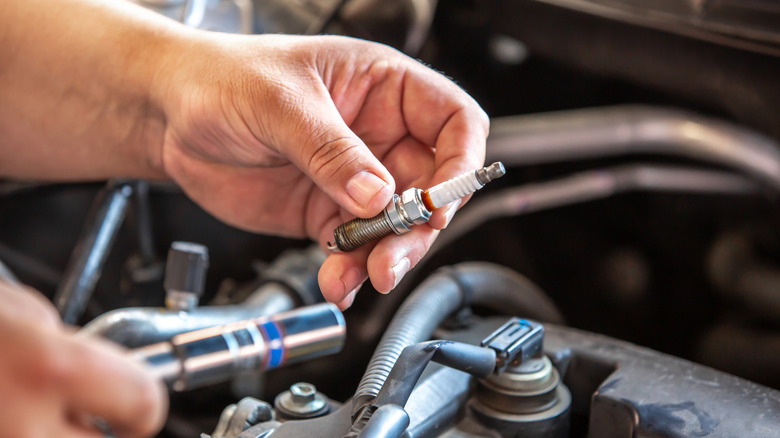How Often Do I Need To Change Spark Plugs

Spark plugs: those small, often overlooked components responsible for igniting the air-fuel mixture in your engine, the very process that generates power. But how often do you really need to swap them out? The answer, as with many things automotive, isn't a simple one-size-fits-all. It depends on a multitude of factors, from the type of plug used to your driving habits and the specific make and model of your vehicle.
The Spark Plug Spectrum: Materials Matter
The materials used in spark plug construction play a significant role in their lifespan. Here's a breakdown of the common types and their typical replacement intervals:
- Copper Spark Plugs: The oldest and most economical option. Copper plugs offer excellent conductivity but wear down relatively quickly. Expect to replace them every 20,000 to 30,000 miles. They are still commonly found in older vehicles and some small engines.
- Platinum Spark Plugs: Platinum plugs boast a significantly longer lifespan than their copper counterparts due to the greater durability of platinum. They typically last 60,000 to 100,000 miles. The platinum electrode resists wear and corrosion much better than copper.
- Iridium Spark Plugs: The king of longevity! Iridium spark plugs feature an iridium center electrode, known for its exceptional hardness and resistance to wear. Expect these to last a remarkable 80,000 to 120,000 miles, or even longer in some applications. Iridium plugs also often provide slightly better performance compared to platinum.
It's crucial to consult your vehicle's owner's manual to determine the recommended spark plug type and replacement interval for your specific engine. Using the wrong type of plug can negatively impact performance and potentially damage your engine.
Driving Habits and Environmental Factors
Beyond the plug material, your driving style and the conditions you frequently encounter can impact spark plug longevity. For instance:
- Stop-and-go traffic: Frequent idling and short trips prevent the engine from reaching optimal operating temperature, leading to increased carbon buildup on the spark plugs and accelerated wear.
- Towing and hauling: Putting your engine under heavy load increases stress on the spark plugs, potentially shortening their lifespan.
- Harsh environments: Exposure to extreme temperatures, humidity, and road salt can accelerate corrosion and degradation of the spark plugs.
If you frequently subject your vehicle to these conditions, it's wise to consider shortening the recommended spark plug replacement interval.
Symptoms of Failing Spark Plugs
Even if you're diligent about following the recommended replacement schedule, it's important to be aware of the signs that your spark plugs might be failing. Common symptoms include:
- Rough idling: The engine may vibrate or shake excessively when idling.
- Misfires: The engine may stumble or hesitate during acceleration. You might even feel a noticeable jerkiness.
- Reduced fuel economy: Worn spark plugs can lead to incomplete combustion, resulting in lower gas mileage.
- Difficulty starting: A weak or failing spark can make it harder to start the engine, especially in cold weather.
- Check engine light: A misfire code (e.g., P0300) may trigger the check engine light.
If you experience any of these symptoms, it's crucial to have your vehicle inspected by a qualified mechanic. Ignoring these issues can lead to more serious engine problems.
The Replacement Process and Cost
Replacing spark plugs is a relatively straightforward procedure, but it requires some basic mechanical knowledge and the right tools. If you're comfortable working on your car, you can tackle this job yourself. However, if you're unsure, it's best to leave it to a professional. The cost of replacing spark plugs varies depending on the type of plug, the engine configuration, and the labor rates in your area. Expect to pay anywhere from $50 to $200 or more for a complete spark plug replacement, including parts and labor. More complex engines (e.g., those with difficult-to-access spark plugs) will naturally incur higher labor costs.
Regular spark plug maintenance is an essential part of keeping your engine running smoothly and efficiently. By understanding the factors that affect spark plug lifespan and being attentive to the symptoms of failing plugs, you can ensure optimal performance and avoid costly repairs down the road. Always consult your vehicle's owner's manual for specific recommendations regarding spark plug type and replacement intervals.
